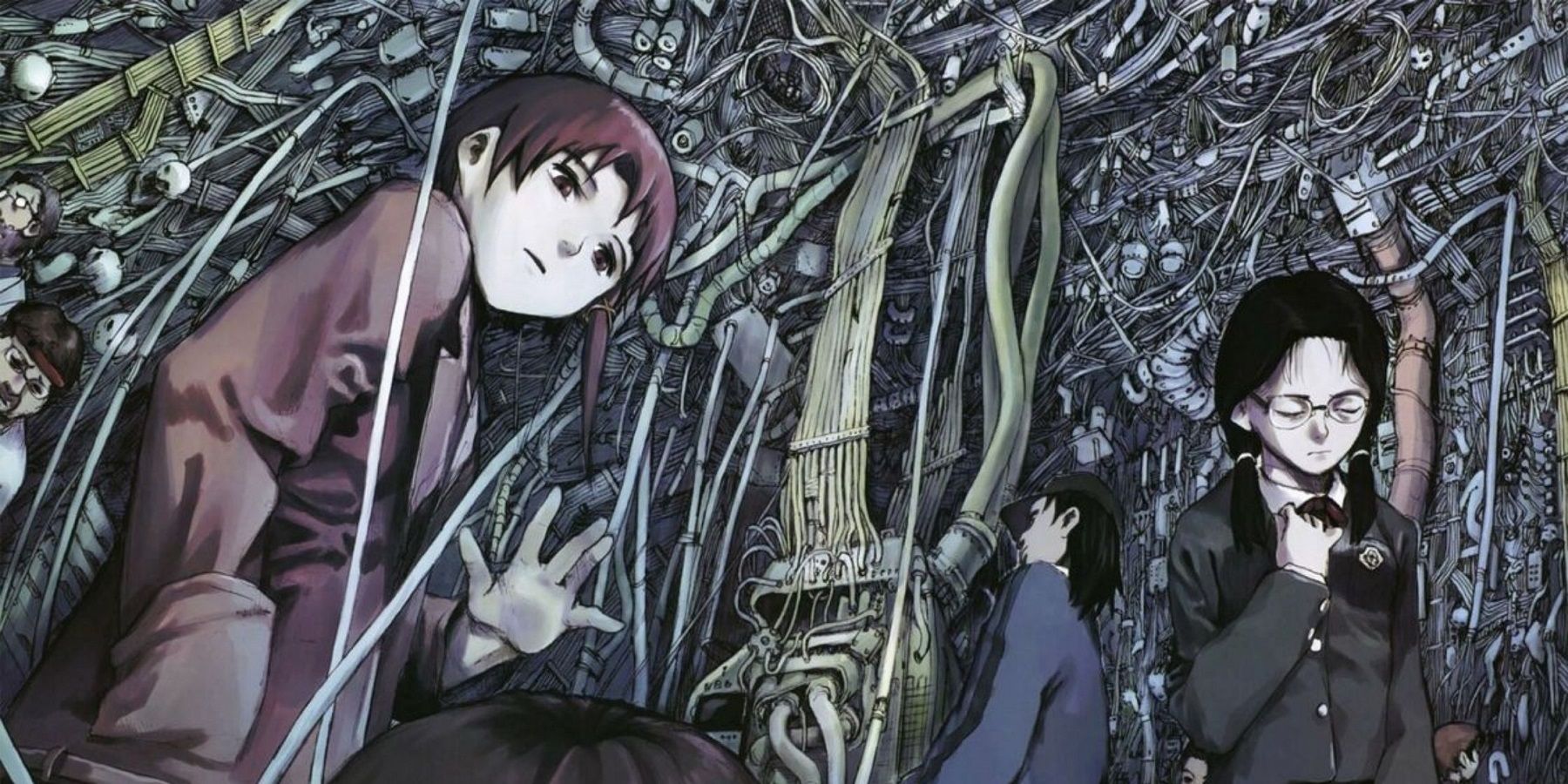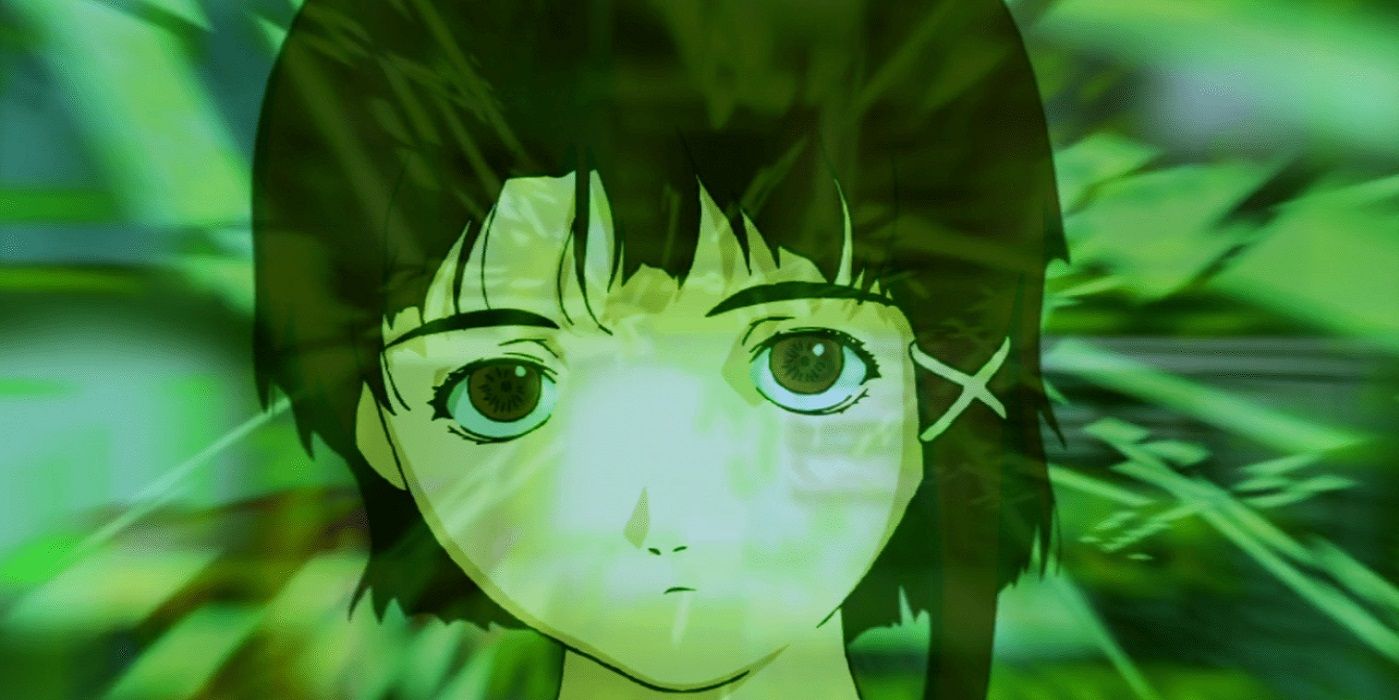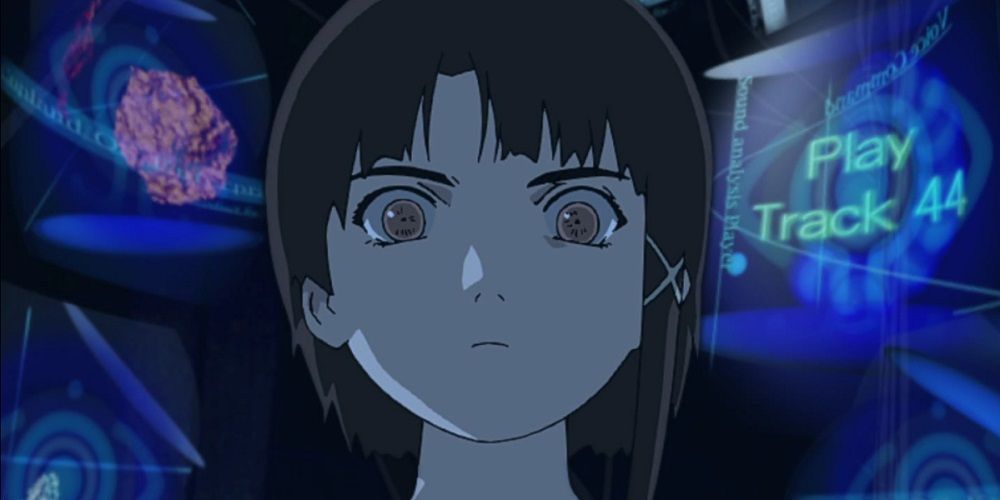Watching something as heavy and thematically dense as Serial Experiments Lain while late at night and utterly exhausted but too wired to sleep is perhaps not the best mindset, at least on a first-time watch-through. None, luckily, Lain has immense rewatch value. Really, it’s the sort of show that needs to be watched more than once anyway, in order to better grasp its story and concepts, if only just a little bit better every time.
If watching it in a fugue state of sorts, it might enhance the surreality and occasional creepiness that it offers, not just with its imagery, dialogue, and characters, but also with its minimal score of occasional guitar riffs both acoustic and or trippy, its silences, and those moments that are silent save for the buzz of the telephone wires in otherwise quiet suburbia. And although the narrative, such as it is, can wander into the occasional philosophical discourse, the part that discusses the foundations for and historical precedence of the Internet is one that might resonate even on a first watch through, regardless of exhaustion.
The Internet And The Wired Are One And The Same
In this nebulous cyberpunk-ish possible future, at least the future as seen from 1998, what’s known as the Internet is here referred to as “The Wired”, but the two are essentially analogous. January 1, 1983, is basically considered the official birthday of the Internet or “World Wide Web”, and even then, it was bare bones at best then. It wasn’t until about ten years later that CERN made its foundations public domain, so by five years after that, in 1998, that’s arguably when its popularity was really peaking past the point of no-return in terms of how it changed the modern world irrevocably.
Like the best sci-fi and all the subgenres it entails, like cyberpunk, Serial Experiments Lain coming out at this time was present to say the least. Perhaps too present. While it’s gained enough of a following then and since its license was rescued by Funimation and given a blu-ray/DVD reprint, also like good sci-fi, how prescient and predictive of the future it really was is something that can really only be appreciated in hindsight. In the case of Lain, that would be how much the Internet has permeated modern life to the point that reality and “cyber reality” really do mesh. Perhaps not as trippily as The Wired does in Lain, but like with most good emotional storytelling that uses abstraction to get its ideas across, the trippiness itself can honestly be taken as a metaphor for what’s really going on in the actual real world. For what at times it feels like it is going on.
The Power To Affect Reality
To give some context, despite its story tripping head-over-heels into surrealism by the end of the first episode, it starts fairly normally. Lain Iwakura is a high school girl who lives a fairly quiet and normal suburban life with her parents and older sister, but she’s also not particularly as into tech as everyone in her class is. That is until she hears about one of her classmates de ella committing suicide, and then that same classmate somehow sending a message through The Wired despues de her death. Curious (and who wouldn’t be, really?), Lain digs up her computer–a “Navi”, short for “Knowledge Navigator”–and decides to look further into this incident, how it is that a dead girl can communicate through something like The Wired, and claim she is really there, and that she’s found God in it. Questions (and only the first few of many) come up, like is it really just a prank someone’s playing? And even if it were, how would anyone be able to verify if that were true or not? What does truth mean when someone could so easily manipulate it through a system like The Wired, a system that’s invisible and yet seemingly everywhere?
What follows are events that entrench Lain not just in the alternate reality of The Wired, but in conspiracies that seem to ominously surround it, the sort that surround anything that causes misgivings in people. In one of the later episodes of the show, there’s a documentary-esque sequence that addresses the concepts that laid the foundation for things like the Internet and The Wired both, like the concept of global consciousness, and the ability to connect that consciousness through a technological network.
Up until this point in the series, there have been incidents that have in some way been connected to The Wired, like a shootout involving nano-tech-related mind-altering drugs at a club literally called “Cyberia.” People connect with others through The Wired, forming communities in what might seem like a plane of existence that’s separate from the “real world.” Groups like these in turn have their effects on the “real world” through their interactions with each other through The Wired. Even Lain herself, does things in The Wired that affect the real world, and even develops a sort of split personality, her real-world persona de ella, and the one she presents on the Internet–like most people do, more than most people probably think.
People exchange ideas, or even just say things, fact or not, through a system that exists, essentially, outside of reality, and then put those ideas into physical actions, or just reach real people, affecting the real world as though reality and fiction are overlapping. Especially when it comes to the last couple of years. Influencers have a strange power over their audiences, a semi-celebrity status, and meanwhile, full-on celebrities are slightly more within reach through platforms like Twitter. All made possible via the Internet. On rewatches of Lain then, coming back to that segment that outlines the historical precedence of the Internet, it’s eerie in some respects how much of an almost cautionary tale Lain could be in terms of how much power something like The Wired–the Internet–an intangible power, has over the physical world. It’s certainly worth keeping in mind, in any case.
Read Next
About The Author


